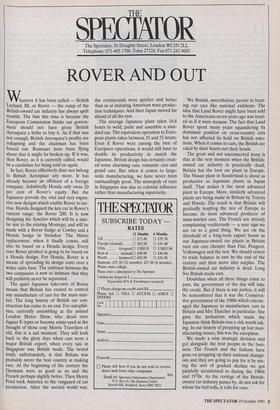SPECTAT THE OR
The Spectator, 56 Doughty Street, London WC1N 2LL Telephone: 071-405 1706; Telex 27124; Fax 071-242 0603
ROVER AND OUT
Whatever it has been called — British Leyland, BL or Rover — the rump of the British-owned car industry has always spelt trouble. The fuss this time is because the European Commission thinks our govern- ment should not have given British Aerospace a bribe to buy it. As if that was not enough, British Aerospace's profits are collapsing and the chairman has been forced out. Rumours have been flying about that it might be broken up. If it was, then Rover, as it is currently called, would be a candidate for being sold on again.
In fact, Rover effectively does not belong to British Aerospace any more. It has already become an offshoot of a foreign company. Admittedly Honda only owns 20 per cent of Rover's equity. But the Japanese provide the vital and very expen- sive new designs which enable Rover to sur- vive. Honda designed the key car in Rover's current range: the Rover 200. It is now designing the Synchro which will be a simi- lar size to the existing Montego, and will be made with a Rover badge at Cowley and a Honda badge in Swindon. The Metro replacement, when it finally comes, will also be based on a Honda design. Every core Rover product is going to be based on a Honda design. For Honda, Rover is a means of spreading its design costs over a wider sales base. The embrace between the two companies is now so intimate that they Will probably never be separated.
The quiet Japanese take-over of Rover means that Britain has ceased to control any manufacture of cars for the mass mar- ket. The long history of British car con- struction has come to an end. For autophil- iacs, currently assembling at the annual London Motor Show, who drool over Jaguar E-types or become misty-eyed at the thought of those cosy Morris Travellers of old, this is a sad moment. They will look back to the glory days when cars were a major British export, when every taxi in Singapore was British made. The brutal truth, unfortunately, is that Britain was probably never the best country at making cars. At the beginning of the century the Germans were as good as us and the French perhaps slightly better. Then Henry Ford took America to the vanguard of car production. After the second world war,
the continentals were quicker and better than us at imitating American mass produc- tion techniques. And then Japan moved far ahead of all the rest.
The average Japanese plant takes 16.8 hours to weld, paint and assemble a stan- dard car. The equivalent operation in Euro- pean plants takes between 35 and 55 hours. Even if Rover were among the best of European operations, it would still have to double its productivity to match the Japanese. British design has certainly creat- ed some charming cars, romantic cars and grand cars. But when it comes to large- scale manufacturing, we have never been outstandingly good. The monopoly of taxis in Singapore was due to colonial influence rather than manufacturing superiority. We British, nevertheless, persist in treat- ing our cars like national emblems. The idea that Land Rover might have been sold to the Americans seven years ago was treat- ed as if it were treason. The fact that Land Rover spent many years squandering its dominant position on cross-country cars has not affected its hold on British emo- tions. When it comes to cars, the British are ruled by their hearts not their heads.
The great and not unconnected irony is that at the very moment when the British- owned car industry is practically dead, Britain has the best car plant in Europe. The Nissan plant in Sunderland is about as productive as Japanese plants in Japan itself. That makes it the most advanced plant in Europe. More, similarly advanced plants are being made in Britain by Toyota and Honda. The result is that Britain will gradually leapfrog the rest of Europe to become its most advanced producer of mass-market cars. The French are already complaining vociferously — a sure sign we are on to a good thing. We are on the threshold of a long-term export boom as our Japanese-owned car plants in Britain turn out cars cheaper than Fiat, Peugeot, Volkswagen and the rest. We should return to trade balance in cars by the end of the century and then move into surplus. The British-owned car industry is dead. Long live British-made cars.
Doubtless when all these things come to pass, the government of the day will take the credit. But if there is any justice, it will be remembered that it was the Conserva- tive government of the 1980s which encour- aged the Japanese to manufacture cars in Britain and Mrs Thatcher in particular. She gave the invitations which made the Japanese think Britain was a risk worth tak- ing. In our history of propping up lost man- ufacturing causes, this was the exception.
We made a wise strategic decision and got alongside the best people in the busi- ness. The French and the Italians have gone on propping up their national champi- ons and they are going to pay for it by see- ing the sort of gradual decline we got painfully accustomed to during the 1960s and 1970s. As the cortege of the British- owned car industry passes by, do not ask for whom the bell tolls, it tolls for vous.


























































 Previous page
Previous page